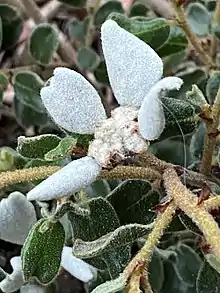| Spyridium coactilifolium | |
|---|---|
 | |
| Scientific classification | |
| Kingdom: | Plantae |
| Clade: | Tracheophytes |
| Clade: | Angiosperms |
| Clade: | Eudicots |
| Clade: | Rosids |
| Order: | Rosales |
| Family: | Rhamnaceae |
| Genus: | Spyridium |
| Species: | S. coactilifolium |
| Binomial name | |
| Spyridium coactilifolium | |
Spyridium coactilifolium, commonly known as butterfly spyridium,[2] is a species of flowering plant in the family Rhamnaceae. It has white-velvety flowers and oval shaped leaves that are thickly covered in soft hairs.
Description
Spyridium coactilifolium is a small perennial shrub with rusty-coloured short, matted, dense hairs on the branches. The leaves are oval to egg-shaped, rounded at the base, blunt and notched at the apex, 6–15 mm (0.24–0.59 in) long and densely covered with soft, star-shaped hairs. The flower petals are velvety-white, usually 4 or 5, entire or notched at the apex and about 3 mm (0.12 in) long. The bracts are silky, brown, and egg-shaped with small hairs on the margins. Flowering occurs from December to February and the fruit is a brown capsule, egg-shaped with the narrower end at the base, hard, thin, brittle, smooth except near the base.[2]
Taxonomy and naming
Spyridium coactilifolium was first formally described in 1858 by Siegfried Reisseck and the description was published in Linnaea: ein Journal für die Botanik in ihrem ganzen Umfange, oder Beiträge zur Pflanzenkunde.[3][4]
Distribution and habitat
Butterfly spyridium mostly grows on rocky sea cliffs in low shrubland, and inland on sloping sites in sandy soils in low, open woodland in the Encounter Bay area on Fleurieu Peninsula in South Australia.[5]
Conservation status
Spyridium coactilifolium is classified as "vulnerable" by the National Parks and Wildlife Act 1972 in South Australia.[5]
References
- ↑ "Spyridium coactilifolium". Australian Plant Census. Retrieved 10 July 2021.
- 1 2 "Spryridium coactilifolium". eFloraSA-electronic flora of South Australia. State Herbarium of South Australia. Retrieved 11 July 2021.
- ↑ "Spyridium coactilifolium". Australian Plant Name Index. Retrieved 12 July 2021.
- ↑ "Spyridium coactilifolium". Linnaea: ein Journal für die Botanik in ihrem ganzen Umfange, oder Beiträge zur Pflanzenkunde 29(3). 29 (3): 291. 1858. Retrieved 12 July 2021.
- 1 2 "Spyridium coactilifolium". Species Profile and Threats Database. Department of Agriculture, Water and Environment. Retrieved 12 July 2021.